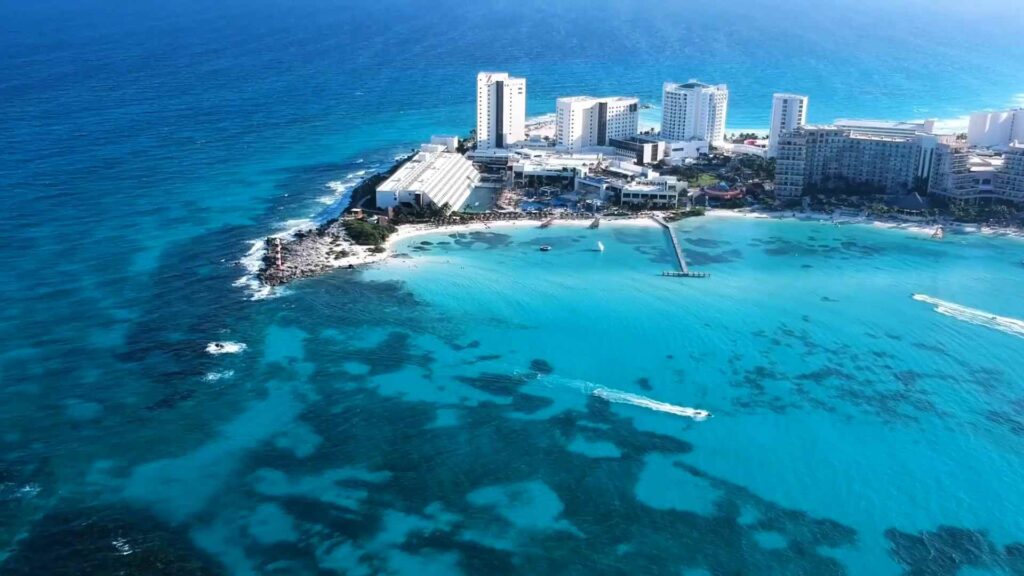Growth in Cancún and Tulum highlights the country’s jump to the top of the global destination charts. Some question whether it can—or should—stay there.
Written by Maya Averbuch from New Economy
It’s 2 p.m. in the Mexican resort town of Tulum, and the beach club at the Ikal Hotel is heating up for its “ecstatic dance” session. Inside a thatch-roofed pavilion, a sweaty crowd bops to a “folktronica” track spun by a DJ whose next stop is Berlin. Down a set of wide stone steps, fit thirtysomethings smack volleyballs on a beach that smells of seaweed and sunscreen. A “treehouse” room will set you back $800 a night, and a bottle of Crémant de Bourgogne sparkling wine runs $110.
A decade ago, Tulum was a sleepy fishing village that served as a gateway to nearby Mayan ruins. These days it’s part of the international party circuit—marketed as a jungle paradise with really great nightlife. The town’s beach strip is lined with tony restaurants, designer clothing boutiques, and chalkboard ads for yoga classes and hand-poke tattoos. With its clubs, linen-clad models, it’s the kind of place where “the hippies become millionaires and the millionaires become hippies,” says tour guide Hervé Pech.
Tulum and its older cousin Cancún, a two-hour drive up the coast, are in the midst of a boom. Tourism is 6% ahead of 2019, and airlines have scheduled 20% more seats on flights from the US this year than they had before the pandemic. Arrivals at Cancún International Airport surpassed 22 million last year, up 82% from 2020. In the past two years more than 16,000 new hotel rooms have been built in the state of Quintana Roo, which includes Cancún and Tulum. The expansion is evidence of—and is fueling—Mexico’s move up the global tourism charts. In 2019 the country was the seventh-most-visited destination; today it’s No. 1 or No. 2, depending on whom you listen to.
That’s largely because unlike almost everywhere else, Mexico never really shut down. Even as European capitals were requiring Covid-19 passes and PCR tests and the US largely barred travelers from dozens of countries, Mexico was quick to throw open its doors, no questions asked, no tests required. The government said tourism was such an important driver of the economy that Mexico could ill afford to close its borders. Poverty in Quintana Roo rose early in the pandemic and the state lost 97,000 jobs, but by June 2020 hotels were already opening up again. That December the governor tweeted that people should keep a safe distance to stop Covid—while boasting that Cancún was back to almost 500 flights a day.
For workers who had to wait tables, scrub toilets, and drive buses or taxis for all those visitors, it’s been a mixed blessing. Mexico’s biggest beach destinations circled in and out of the news as they suffered from coronavirus spikes presumably brought on by tourists. Roger Martín Moreno says he thinks he got the virus while handing out drinks and coffee on a tour bus. “It started with a fever, and little by little I started to be short of breath until I could only breathe lying down,” says the 34-year-old, who says at least two drivers from his agency died from Covid.
And there are growing concerns about the boom’s sustainability. The increasing numbers of visitors threaten the area’s signature freshwater caverns, called cenotes, as well as the largest barrier reef in the Western Hemisphere. Some fear Tulum could go the way of Acapulco, which in the mid-20th century became a glittering destination where Frank Sinatra escaped for a secret birthday, Elizabeth Taylor held her third wedding, and the Shah of Iran’s family holed up after the revolution.
Tulum has become a focus of attention for individuals who are looking to secure and grow their money. And real estate or the real estate industry represents an excellent opportunity for them: low tax costs, insurance against inflation and the possibility of obtaining extra income and thus, a greater return on investment.
Co-Founder Chief Operating Officer and Financial Officer
C.P. Karina Sayed
